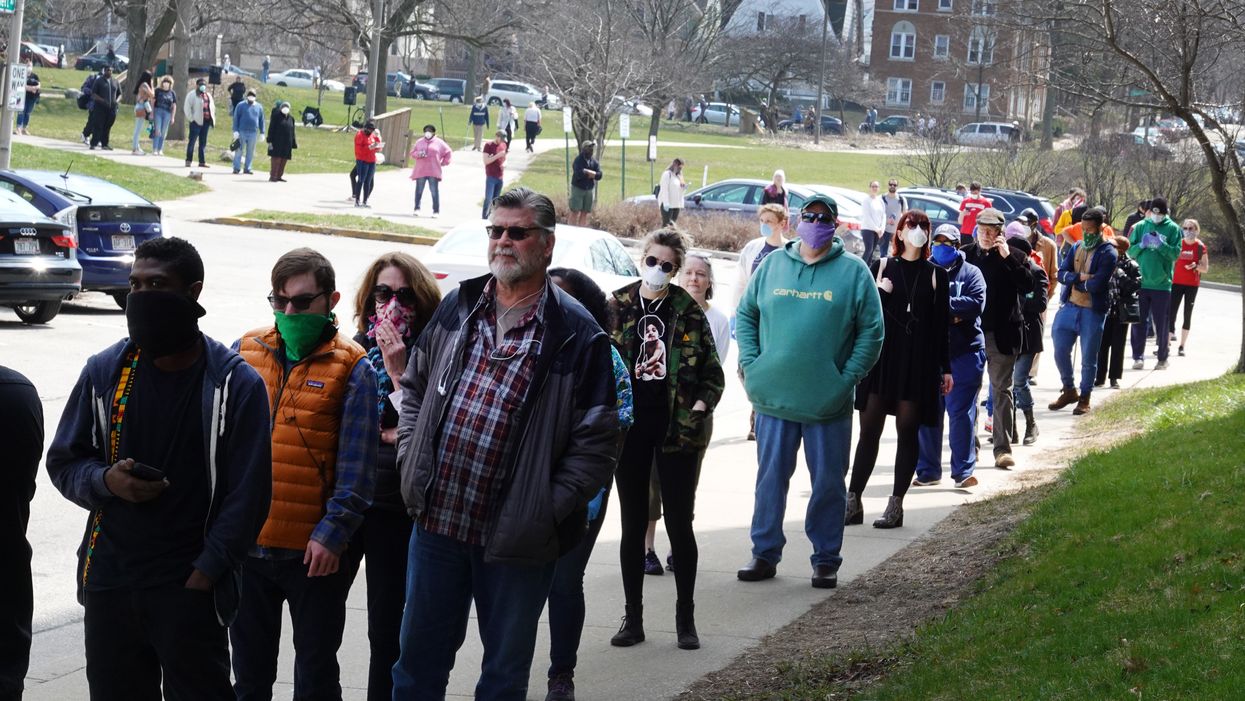Bernie Sanders ending his campaign, obviating the need for more Democratic presidential primaries, is the biggest news of the week about keeping democracy safe during the coronavirus pandemic.
The Vermont senator dropped out Wednesday, hours after the end of a chaotic day of primary voting in Wisconsin that went ahead on schedule even though a federal court is keeping the results sealed until next week.
Florida's local election officials and Democrats in Texas, meanwhile, launched efforts to prevent such a shambolic situation in their states during summertime primaries. New Jersey prepared to become the 16th state postponing partisan contests, while the inability to gather ballot petition signatures put a veteran senator in a bind.
These are the latest developments:
Texas
Democrats filed their latest federal voting rights lawsuit in the state Tuesday, citing the spread of the coronavirus as the reason for a significant expansion of voting by mail in the second-most-populous state.
The state party's suit maintains that holding July 14 runoffs and the November general election under current rules, and while complying with public health guidelines likely to be in place, would be unconstitutional in several ways and violate the Voting Rights Act.
Texas has one of the more restrictive absentee voting laws in the nation: Getting a vote-by-mail ballot requires signing an application saying you are disabled, older than 65, in jail awaiting trial or will be out of the county both during early voting and on Election Day. The lawsuit says those limitations discriminate against younger people and those without disabilities.
The all-Republican government in Austin vowed to contest the suit and has already filed a response to earlier litigation, filed in state court, arguing the Texas Election Code permits balloting by mail during a public health emergency. That's because its definition of disability includes "a sickness or physical condition that prevents the voter from appearing at the polling place on election day without a likelihood of needing personal assistance or of injuring the voter's health."
GOP Gov. Greg Abbott has issued a stay-at-home order of indefinite duration and ordered the postponement of the local May elections into the summer.
Florida
A bipartisan group of 67 local election supervisors Tuesday warned Republican Gov. Ron DeSantis of chaos without changes to election rules in the nation's biggest swing state in time for the Aug. 18 primaries.
"Florida is not in a position, at this time, to conduct an all-mail ballot election this year," Tammy Jones, the president of the state Association of Supervisors of Elections, wrote on behalf of every member of the group.
As an alternative, they urged the governor to issue an executive order expanding to 22 days the periods for early in-person voting before the primary and general elections and to keep those polls open through Election Day, which they said would allow a consolidation of polling places.
Even in a normal year, about one-third of the state's votes in November are by mail. That number seems sure to surge this fall, in part because Democrats recently launched an expansive campaign — with 1 million texts and 200,000 mailers — to get their core supporters to request their no-excuse absentee ballots.
The party is hoping a big turnout pushes the state's 29 electoral votes into the blue column. Florida has voted for the winner in six straight presidential elections, but generally by extremely narrow margins — most historically George W. Bush's win by 537 official votes 20 years ago.
Massachusetts
The hottest Democratic primary for a Senate seat in the country has been scrambled by one candidate's inability to circulate petitions because of the state's stay-at-home order.
Amazingly, the problem is facing the long-serving incumbent. Sen. Edward J. Markey, who's been in Congress since the 1970s, has gathered only 7,000 of the 10,000 signatures from registered Democrats or independents required to secure a place on the Sept. 1 primary ballot. He has four weeks, until May 5, to get them.
His challenger, Rep. Joe Kennedy III, has already gathered 50 percent more than the minimum required and sent them to local officials for certification.
In addition to sending canvassers to grocery stores and town meetings to gather signatures, candidates in the state usually rely on local party caucuses. But those scheduled for the coming weeks have all been postponed because of the pandemic. So now Markey has to rely on a cumbersome process: Get supporters to go to a website, download a form so the campaign can mail them a paper copy of a Markey's nomination request, sign the paper and then mail it to campaign headquarters.
Candidates for other down-ballot contests have asked the Legislature to significantly lower the signature thresholds for various offices, but so far there's been no movement.
New Jersey
The state, which after New York is by far and away the hardest hit by the pandemic so far, has all but formally decided to postpone its primaries by five weeks, to July 7.
Democratic Gov. Phil Murphy, who had earlier delayed local elections and converted them to exclusively mail-in ballots due in May, planned to make the announcement by Thursday.
In the statewide primary, Democrats will assign 186 delegates to the presidential convention and both parties will pick nominees for Congress. State and legislative offices are not on the ballot this year.
Fifteen states have already either pushed back their presidential primaries or switched to voting by mail with extended deadlines. New Jersey, with more than 44,000 confirmed Covid-19 cases and more than 1,200 deaths, was originally going to be part of a small group voting June 2. Now it's hopscotched beyond six states that have switched to that date.




















Trump & Hegseth gave Mark Kelly a huge 2028 gift